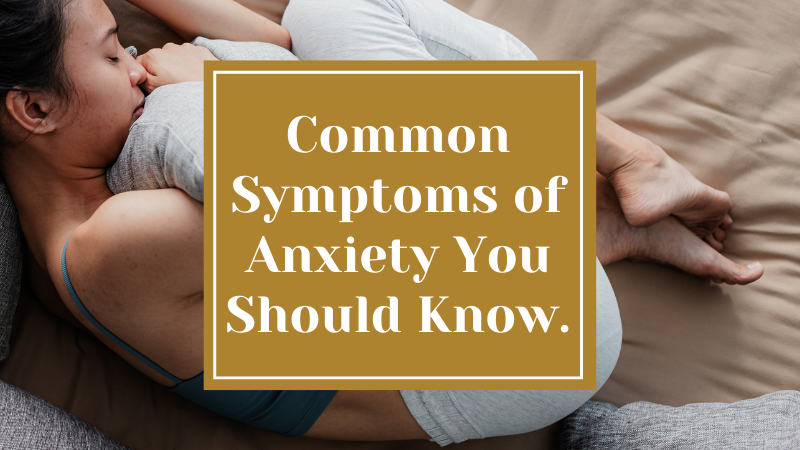What is Anxiety?
One thing you might notice is that many of the symptoms of anxiety are physical (we feel anxiety in our bodies). Why is this? Well, our brains do not like to be fearful or worried about nothing in particular, so it is very common to turn the underlying emotions into physical symptoms.
According to an article from Psychcentral, the most common symptoms of anxiety are:
- Muscle Tension
- Physical Weakness
- Poor Memory & Concentration
- Fear or Confusion
- Inability to Relax
- Constant worry
- Shortness of Breath
- Palpitations
- Upset Stomach
Let’s look at each of these one at a time, and discuss how it relates to anxiety:
1. Muscle Tension
People who struggle with anxiety often report that they feel tightness and tension in their muscles. Muscles tense in response to the well-known “flight-fight-freeze” response. This response is the result of human evolution: when we are confronted with something that we find to be threatening, we immediately and unconsciously must make a decision to fight, flee, or freeze.
Muscle tension occurs as a result of the heightened state of awareness that comes with anxiety. Muscles feel tight because we become rigid and prepared to fight or run away from whatever it is that is triggering our anxiety response.
Unfortunately, we often are not aware of what is triggering our anxiety, so our bodies get worn out easily when we are anxious. The result is the other symptoms that go along with anxiety.
2. Physical Weakness
When we are anxious we often feel weakness in our bodies. The initial response of tension and preparing to fight or run away wears off and we become weak and tired. This weakness has the effect of making us more anxious.
Many people with anxiety find themselves developing a fear that there is something physically/medically wrong with them. This is partly because of the weakness and other physical symptoms that go along with anxiety.
3. Poor Memory & Concentration
When we are anxious we use a lot of our body’s energy, and it becomes difficult to remember or to concentrate on important things. Our brains and bodies are in a state of hyper-awareness where we are looking for some unknown danger, this makes it difficult to focus on daily activities, and we can become forgetful.
Concentration on a task that requires a lot of attention and detail becomes nearly impossible because we are focusing on unknown threats, and therefore we have trouble focusing on what we are supposed to be doing.
4. Fear or Confusion
When we are anxious we may indeed feel a sense of fear, but we are not always able to determine what it is that we are afraid of. Even if we can, we may realize that our fear is not rational or likely.
Confusion occurs as the feelings of fear become overwhelming and all of our mental energy is focused on the feelings of fear which causes us to become confused.
5. Inability to Relax
When we are anxious we just can’t relax. Relaxing is not possible when we are feeling threatened.
This can lead to difficulty sleeping, and this creates further weakness, tiredness, and confusion or “fogginess.”
When we cannot relax we cannot get the rest and rejuvenation that we need in order to truly live our lives. We find that the anxiety takes over.
As a substitute for true relaxation, we find ourselves isolating and becoming solitary to avoid the unknown and unspoken fears.
6. Constant Worry
As we will discuss shortly, there is usually an underlying cause of anxiety, but when we cannot identify it we tend to worry about almost everything.
A red light means “I will be late for work.”
Being summoned into the boss’s office means “I am getting fired.”
Even when we are home alone, we might find ourselves worrying about potential fire hazards, gas leaks, electrical problems, or other unlikely events.
7. Shortness of Breath, Palpitations, and Upset Stomach
Some people experience symptoms such as shortness of breath (the feeling that we can’t breathe), palpitations (the feeling that our heart is racing), and upset stomach. These physical symptoms occur as our anxiety tries to keep us away from those things that we are afraid of.
We feel sick, but it is basically a defense mechanism that we use to keep from being exposed to what we are afraid of. These symptoms are the body and brain telling us that there is danger.
What Causes Anxiety?
Anxiety is sometimes as simple as a chemical imbalance in the brain, but more often than not it is a result of some type of past experience. Often these are negative experiences.
For example, being chased by a dog as a young child might cause a person to develop a fear of dogs in adolescence and adulthood. These types of fears are relatively normal, but when a person starts walking blocks out of the way because a dog was seen or heard- that is probably anxiety.
What is important to remember is that the person in the example above is not scared of the dog that he now is avoiding, he is reliving the fear of the dog from childhood. We call this a “trigger.”
Triggers occur when something reminds of a negative past experience and this creates anxiety. These triggers could be almost anything: a smell, a voice, something we see, something we hear, something we feel, or even something we remember.
There is, however, another type of anxiety called “generalized anxiety.” Generalized anxiety typically involves an unspecified anxiety. The person who struggles with generalized anxiety is not aware of what is causing his or her anxiety.
This type of anxiety is not all that uncommon, and it actually often is the reason that we experience anxiety in our bodies. The physical responses we discussed earlier often accompany this type of anxiety. Our brains are confused because we are experiencing fear, but we cannot identify a specific source.
Generalized anxiety is usually chemically based, but it can be related to past experiences—just like the other types of anxiety.
What Should I Do If I Think I Might Have a Problem with Anxiety?
The most important thing you can do if you have anxiety is to be honest with yourself. I have struggled with anxiety my entire life, but didn’t admit it to myself until my late twenties when I started having panic attacks.
It is difficult to admit that we have anxiety, especially when you struggle to identify why. Unfortunately, though, we usually make our anxiety worse when we try to avoid or ignore it.
If you have any of symptoms we discussed above, the first step is to see a physician. This rules out medical conditions and causes for these sensations. Unfortunately, many of these symptoms do mimic serious health problems. Once these problems are ruled out—we often discover that we have anxiety.
Once we have accepted our problem there are many things that we can do for treatment at home, but sometimes we need to seek professional help.
In the next article we will look at some things you can do in order to manage your anxiety on your own. Then we will look at when anxiety might be a little out of control, and when to seek professional help. Have a great week, and look for next week’s article on ways to manage anxiety symptoms.



